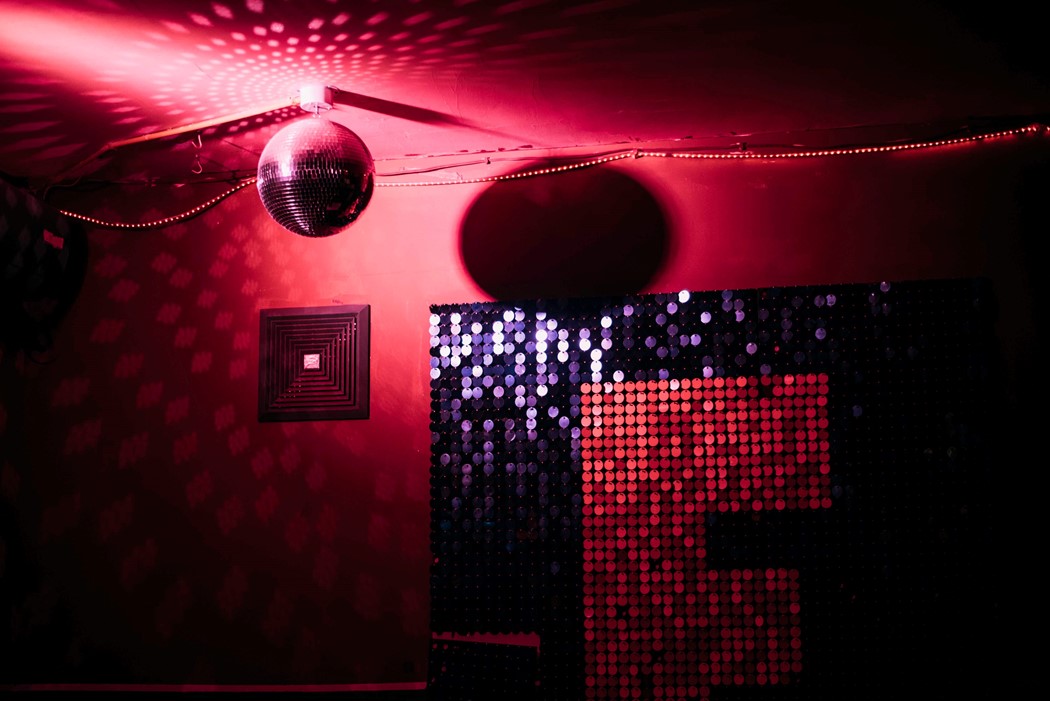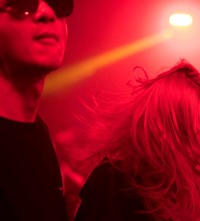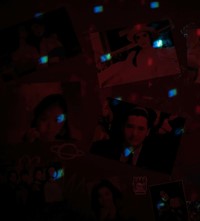On the Merits of Clubbing Alone
- TextBarclay Bram
Barclay Bram started going to clubs alone when he moved to Chengdu, China. “I guess clubbing alone doesn’t feel lonely because while I have not come with a person, I have, in an abstract and secular sense, come to be with my people,” he writes
You’ll find Funkytown next to a pizza bar and the gaping maw of a mid-construction subway line. It’s a small bar/club in Chengdu, Southwest China. It has a disco ball in the main room, though the club is small enough that calling it the ‘main room’ seems a bit much. A neon light flashes the words ‘civilised dance-floor’ in Mandarin. For a while the wall behind the DJ was covered in tin foil and duct tape that made for nice twinkled refractions of the tracer-arc of disco ball squares and neon. Now that has been replaced by a deep red velvet curtain.
Tonight, the DJ is playing a well-mixed funk-house set that sometimes flirts with disco-italo. The crowd is a melange of cool Chengdu scene-kids, most of them a decade younger than me. The bar sells NoX balloons and the kids huff them around me. Then, as they near the end, they let go and stumble and giggle as the black plastic flies off into the air. Sometimes an old Chinese ayi walks past with a straw broom and sweeps them up.
Like most of the times I’m at Funkytown, which tends to be about once a week when I’m in Chengdu, I came alone.
I’ve been clubbing alone now for the best part of a year. It started when I moved to Chengdu and has now metastasised. I’ve clubbed alone in Shanghai and in Rio and I’m going to be back in London, where I grew up, this summer, and I’m wondering if I’ll go clubbing alone there. I’m nearly 30 now; one of my best friends is getting married and part of the reason I’ll be back in Europe this summer is to go to the wedding. A girl on my Instagram posts daily updates from an ashram in Rishikesh. Another friend just posted a picture of her speaking to the UN security council.
Years living not in London I’ve been buoyed by the fact that whenever I go home, I can always slip back into my old scene and pick up where I’ve left off. Now, as I enter the twilight of my twenties it seems that the liminal period in which there would always be someone going to some night somewhere is closing itself off. Those halcyon days of nights that bled into days are now spin classes that bleed into brunch. “Don’t worry you’re not missing anything,” a mate tells me, “we don’t really go out anymore anyway.”
I’m doing a PhD at a university in England, but I’m doing my fieldwork here in Chengdu. I am writing an ethnography about mental health; I spend a lot of time talking to therapists and their clients about trauma. They’re older than me, most of them. I don’t really imagine that Dr Liu, in her 60s, a fine-blousy woman with hair she’s accidentally dyed purple trying to cover her greys, is down for a boogie chez Funkytown.
My friends in town are also older. They’re people I have met tangentially through my research or through a friend I know who owns a restaurant. They don’t see much in whiling away the early hours under a disco ball at Funky. Especially mid-week, which is when the DJs I like most are playing.
Clubbing alone started when I saw Bradley Zero had been randomly booked to a play a club in town. I saw it posted on my WeChat as I was going to bed on a Saturday night just after arriving and realised that it wasn’t that far from my apartment. I had just got here; obviously I didn’t know anyone to go with, so it didn’t seem that weird to go alone. The event had already started; I didn’t really have time to talk myself out of going as I might have if I’d seen it advertised a week before. I slipped into the club and danced for four hours without realising it. After a while I noticed I was tired and went home.
There was no waiting for my mates, corralling them to the smoking area to ask where we were going or who was taking what night bus or waiting for the one who works in finance to call an Uber. I just walked out onto the street, scanned the digital bar-code on a shared bike with my phone and cycled home.
Then a week later I saw an advert for an all-woman line-up of local DJs playing in an art space on the outskirts of town. It looked cool so I went. There was a massive line. I waited for a while as they processed us through and was made to pay 100 yuan, which surprised me as I’d thought it was free, and also, to be honest, I hadn’t really expected a long queue. Then when I got in and everything got underway, I realised I’d actually gone to the wrong warehouse space (it’s a complex of art spaces and tech companies and a cross-fit studio) and had just paid to watch a Japanese pop-punk band. There are highs and lows to clubbing alone.
To be fair, it wasn’t all bad. I didn’t have to apologise to anyone except myself.
Clubs have existed in China since the 1980s, but they haven’t been the dominant mode for nocturnal socialisation. As the anthropologist John Osburg writes in his book Anxious Wealth, that would have been KTVs – karaoke parlours – augmented by trips to banquet halls and massage places and bathhouses. As the Chinese economy opened and vast amounts of the state apparatus were sold off into private hands, entrepreneurs would foster relationships with government officials, cementing their ties through mutually enforced debauchery.
KTVs have the benefit of being discreet; unlike their western facsimile, karaoke bars in the East are rigidly hierarchical spaces of private rooms ascending in luxury and price, to the point where you have ones with free-flowing drink-accompaniers (i.e. hookers), marble counter-tops, cinema screens and a butler whose sole job is putting your song request through the machine.
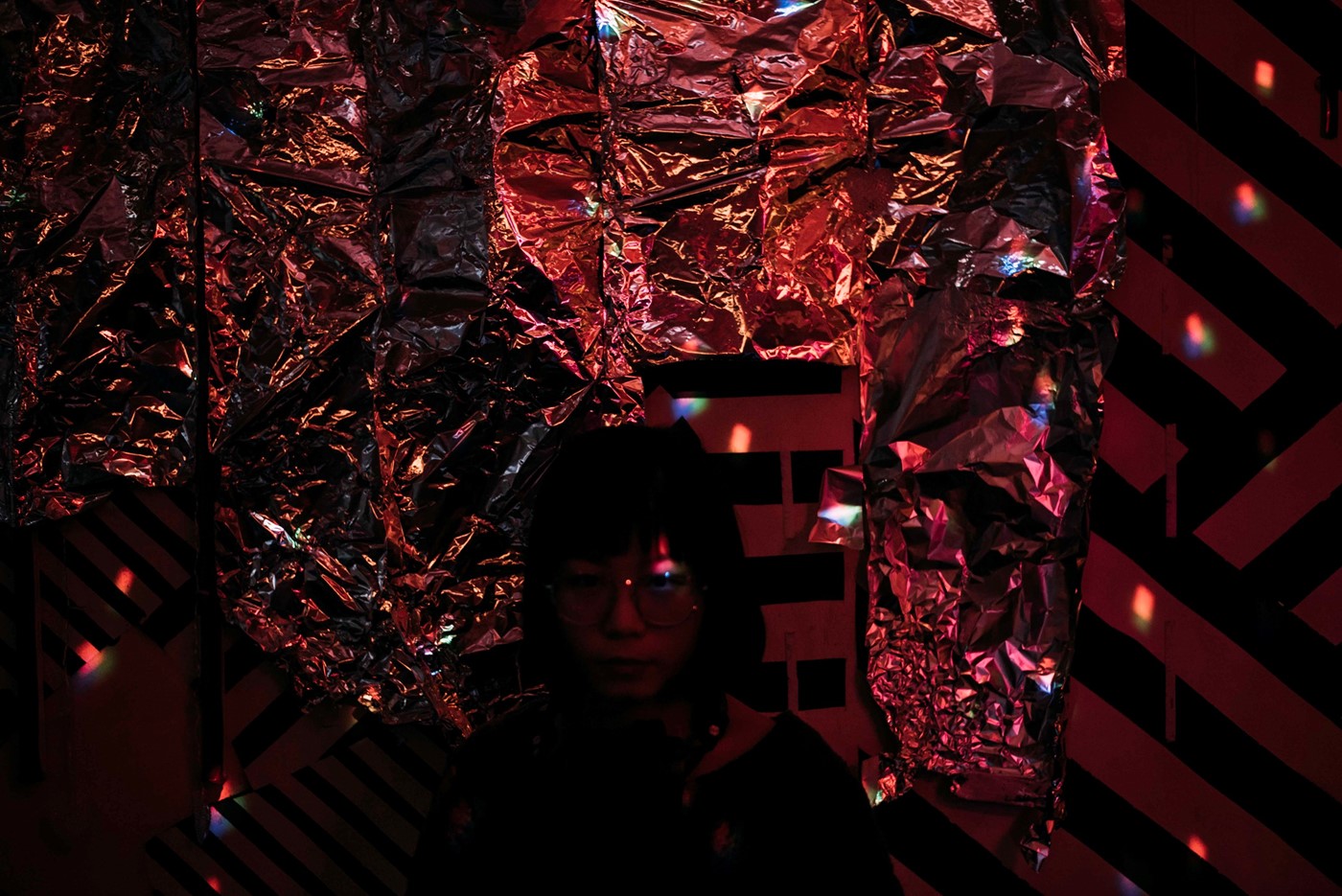
Clubbing is now taking off because kids don’t want those kinds of private spaces anymore; Xi Jinping’s brutal anti-corruption campaign makes the kind of seedy masculine socialising that sealed deals in the 90s untenable, and kids now want to flaunt their wealth openly.
The majority of Chinese clubs are not like Funkytown. They tend to be table-heavy, play EDM and be obscenely large. If clubbing is occasionally referred to as going to church, then the metaphor extends along a mutually occurring spectrum that runs from the intimate place of worship all the way through to the evangelical mega-church; the common denominator is worship, the distinction being how much the divine is mediated by your capacity to spend.
It is not fun to club alone in a Chinese mega-club. I speak from experience. Maybe that is because the beauty of clubbing for me has always been the anonymity and pseudo-democracy – an ironic phrase when a lot of my favourite clubs have strict face-control on the door – that comes when you find yourself lost in a multi-coloured crowd, on one level, in dim lighting, with the DJ guiding the room. Clubbing can be political and it can also not be. I do believe, perhaps naively, that there can be transcendence on dancefloors; a temporary loss of self that is predicated on the need to not be found.
In a lot of the mega-clubs there isn’t even a defined dancefloor; there are only tables, and they stretch the full length of the club, leaving a tiny sliver of floor directly beneath the DJ. This says a lot about intention; you aren’t supposed to lose yourself in a space where you have paid a lot of money for a specific table.
Funkytown is not a Chinese mega-club; the kids who go there are the same kids who in London wouldn’t be seen dead at Whiskey Mist or who have guestlist for Theo Parrish in New York, at that one warehouse space in Bushwick they use for every ‘secret’ warehouse party.
It’s cute – drugs are few and far between since the Chinese Communist Party started parking buses outside of clubs and piss-testing everyone inside – which means you don’t have to confront the techno-zombies or whip-jaw gurners. It’s PG-13 clubbing without dancing on the knife-edge precipice between hedonism and a problem. I don’t drink, so it’s a purely sober experience for me. It’s cheaper than a gym membership.
Without drugs less people randomly talk to you, but that also might be because in Chengdu they assume a language barrier when they see me. The other day someone drunkenly grabbed me and in broken English told me he’d jammed with me the other night at Tag, the techno club down the road. I’d been in Shanghai that weekend, I said. “How embarrassing,” he said, shaking his head, “all white people look the same to me.”
No one seems to think it’s weird that I’m there alone. It’s not as if I blend in. I’m tall and I have blue eyes. A few people recognise me; they nod when they see me, but we don’t really go much beyond that. Would it be the same in London? Would I not feel like it reflected poorly on me, that in the city of my birth, with all those people I know from all those lives I’ve lived, if I couldn’t find one to come with me? Even if the whole night we basically ignored each other in a loud room and then they left with someone they met in the smoking area? What if I think I might actually prefer clubbing alone?
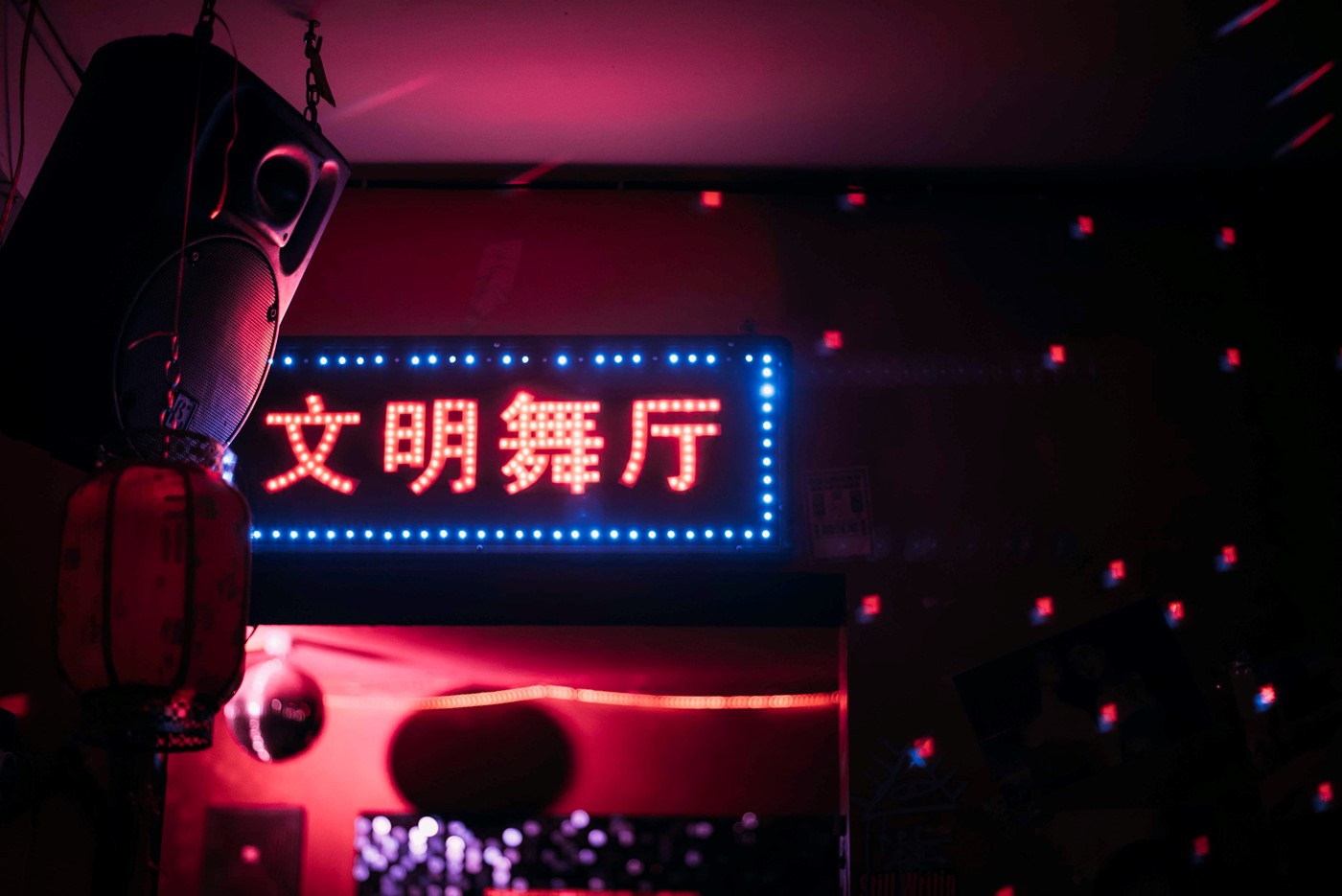
I’m not naive enough to not acknowledge that clubbing alone is a privilege (though of all the privileges, I’m guessing it’s not the one the alt-right is most ardently fighting to keep). Minorities and women probably wouldn’t feel as comfortable clubbing alone, even in the kind of progressive and tolerant spaces I’m trying to champion here. That is a reflection of all of us in these spaces, whether we have come alone or not. A club is only as permissive as its clubbers. Next time you are out, consider whether or not you are helping to create an environment that someone could have turned up alone to. We all deserve the ambient joy of being both welcomed and ignored.
Funkytown’s discoball keeps turning. Bedazzled globe above and the earth beneath both rotating as time syncopates to life’s rhythms. There were things I thought I’d never do alone that, as I’ve gotten older, have become more routine. I eat out alone, go to the cinema alone, I swim alone, having not found a team to join, amniotic in the rushing silence of water. To that list is added clubbing, though I find that it is like being alone in a different key.
I study mental health; I know that loneliness is killing us – people with weaker social ties have a 50 per cent higher chance of dying early than those with stronger ones. The ties that bind also tether. I guess clubbing alone doesn’t feel lonely because while I have not come with a person, I have, in an abstract and secular sense, come to be with my people. In the choice between trying to keep reading at 11pm long after I can’t take anything in or scrolling through Instagram gazing at the world I’ve left 5,000 miles away and seven hours in the past, there are worse ways to pass an evening than a solo shuffle.
Maybe, if you’d like, we could go together one day.
